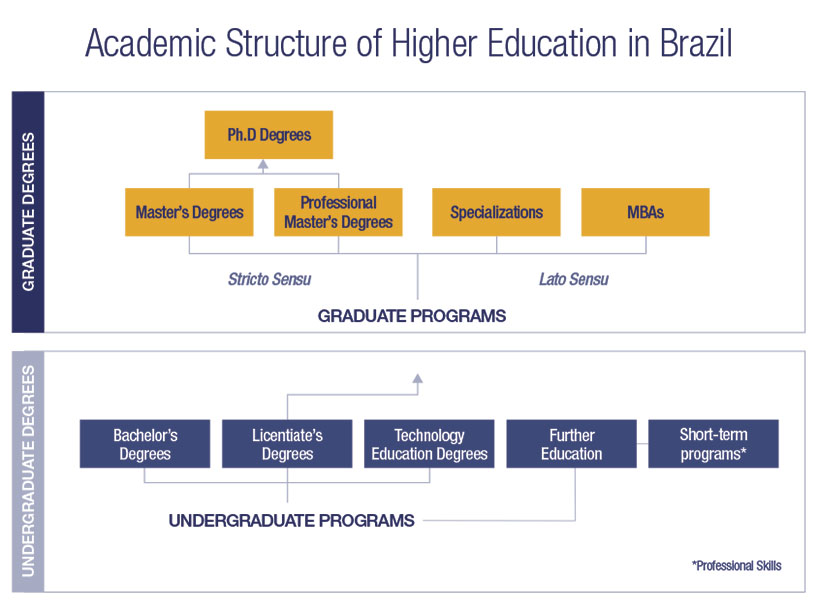Education in Brazil
The Brazilian system is organized according to the law that establishes the guidelines for the national education system (Law n. 9.394 of December 20, 1996). The classification of the institutions of higher education happens according to their academic organization and they are accredited by the Ministry of Education as: Universities, University Centers, Colleges and Integrated Schools, Institutes of Technological Education and Centers of Technological Education. Universities are ranked as the most comprehensive academic structure in which education, research and extension activities are mandatory.
The Higher Education System comprehends the following programs:
Undergraduate Level
The undergraduate level is open to applicants who have completed high school. It includes three main categories: bachelor's, licentiate's, and technologist degree.
- Bachelor's degree: according to the Brazilian Ministry of Education, this degree provides its alumni with skills for the exercise of academic or professional activities in a particular field of knowledge.
- Licentiate's degree: comprehend programs which prepare students to teach at basic education.
- Technologist degree: includes programs with a reduced time (from 2 to 3 years) with a very specific object of study.
Graduate Level
The graduate level is offered to applicants with undergraduate degrees and comprehends lato sensu and stricto sensu programs.
- Lato sensu: comprehends the executive education system, divided into specializations, MBAs, and short-term programs. With a minimum duration of 360 hours, at the end of the program, the student will receive a certificate, not a degree. To conclude the program, the student will need to present a monograph.
- Stricto sensu: comprehends the Master’s and Doctoral programs open to graduated candidates. At the end of the program the student will receive a degree.

Evaluation System
In Brazil, the official assessment of higher education quality is carried out by Government agencies. The National Institute of Educational Research (INEP) evaluates the undergraduate programs. It is responsible for the entire evaluation system of the undergraduate education in the country. It produces indicators and an information system that supports the regulatory process, performed by the Ministry of Education and it ensures data transparency on the quality of the higher education throughout society. In Brazil, the Evaluation System of Higher Education (SINAES) was established by law in 2004.
The SINAES establishes that the assessment of each institution is expressed in three grades:
(1) Grade of the Institution, which is the basis for the authorization and the renovation of the institution by the Ministry of Education and it is a result of an on-site evaluation, made by INEP, which considers the results of self-assessment;
(2) Grade of the Programs, ranging from 1 to 5; and
(3) Grade of ENADE, based on the students’ assessment and available for some undergraduate programs. The measures used are based on the students’ performance and input variables (faculty, infrastructure and education program).
The evaluation of the graduate programs is held by Capes (the division of the Ministry of Education devoted to graduate programs) and it includes an annual monitoring and the completion of a triennial performance assessment for all graduate programs. The results of this process are expressed by the award of a grade (Nota Capes) in the range of 1 to 5, valid for three years. This grade is used as a base for renewal or withdrawal of a program in the three subsequent years. Capes may attribute grades from 6 and 7 to programs in recognition to their international excellence.